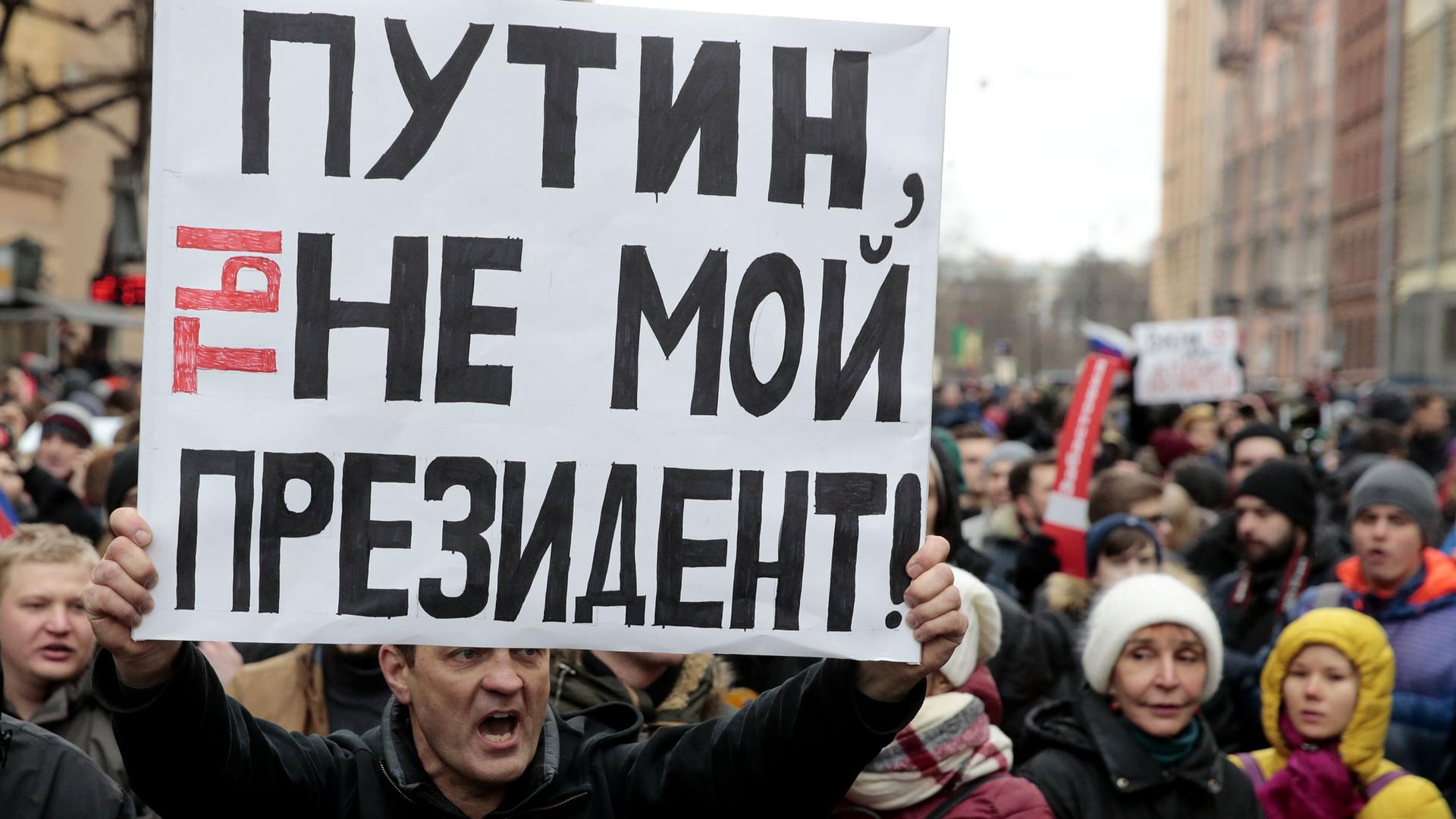Russia’s Navalny arrested as thousands protest upcoming presidential election
Supporters of Russian opposition leader Alexei Navalny attend a rally for a boycott of a March 18 presidential election in St. Petersburg, Russia on Jan. 28, 2018. The signs reads, "Putin, you are not my president." Police later arrested opposition leader Alexei Navalny for "organizing unauthorized protests."
Russian police on Sunday detained opposition leader Alexei Navalny in Moscow as thousands rallied across the country against a March election expected to extend Vladimir Putin's Kremlin term.
Surrounded by supporters, the 41-year-old charismatic politician chanted "Swindlers and thieves" before being detained shortly afterward at an unsanctioned gathering in the city center amid heavy police presence.
Navalny urged Muscovites to take to the streets despite his arrest.
"You are not rallying for me, but for yourselves and your future," he tweeted.
Heeding a call by Putin's bete noire, thousands braved freezing temperatures to stage rallies in dozens of cities to protest upcoming "pseudo-elections," as Navalny and his supporters refer to them.
Many chanted and brandished placards saying "Voters' strike" and "Without me."
About 3,000 to 4,000 people turned up for the unsanctioned rally in Moscow.
Authorities beefed up security, dispatching police vans and passenger buses to the city center, but police largely refrained from arresting protesters.
Ahead of the Moscow rally, police broke into Navalny's headquarters using a power saw, interrupting a live broadcast covering protests in the east of the country.
Police also detained several employees of his Anti-Corruption Foundation as well as supporters.
In Moscow, a crowd of protesters was later allowed to walk down to Red Square. Authorities estimated the Moscow turnout at around 1,000 people.
Police said Navalny faced penalties for organizing an unpermitted protest, adding he had been taken to a police station.
Around 240 people were detained across the country, according to OVD-Info, an independent group which monitors crackdowns on demonstrations.
Sunday's turnout paled in comparison to last year's rallies when tens of thousands rallied against corruption among Russia's elite in March and June 2017.
Police unleashed a severe crackdown afterward, arresting more than 1,000 people including schoolchildren.
Navalny himself served three jail sentences of 15 days, 25 days and 20 days for organizing unauthorized protests last year.
But many protesters said Sunday authorities would not intimidate them.
"These are not elections because we already know the result," Elena Ruzhe, 62, said while protesting in Moscow.
"I'm not scared to protest," added the former culture ministry worker.
Protester Alexandra Fedorova, who wore a fur coat, said it was wrong not to let Navalny take part in the vote.
"I don't see a future. There is nobody to vote for," the 27-year-old said.
Protesters expressed similar sentiments in the second city of Saint Petersburg, the Russian leader's hometown, where at least 1,000 people rallied, some chanting "Russia without Putin" and "Putin is a thief."
"I want change," Andrei Petrov, 20, said. "We are tired of living in this quagmire."
Earlier in the day, opposition supporters protested in far eastern Russia and Siberia, including in the northern city of Yakutsk where Russians rallied despite temperatures of around minus 49 Fahrenheit.
In the Ural city of Yekaterinburg, around 1,000 people rallied, with the city's mayor joining the crowd.
Navalny — seen as the only politician with enough stamina to take on Putin — has built a robust protest movement despite constant police harassment, tapping into the anger of a younger generation yearning for change.
He says the upcoming election will be little more than a coronation of Putin, who is expected to win a fourth presidential term and extend his Kremlin stay until 2024.
Putin's spokesman Dmitry Peskov warned unsanctioned rallies would lead to "certain consequences" — a thinly-veiled promise of punishment.
Last year, Navalny mounted a forceful bid to run for president but officials ruled him ineligible due to a criminal conviction which he says is politically motivated.
Navalny has said he would use the full force of his campaign — including more than 200,000 volunteers — to organize "voters' strikes" and encourage Russians to stay away from polling stations on election day.
After 18 years of leadership, both as president and prime minister, Putin fatigue is spreading across Russia.
But the post-Soviet turbulence of the 1990s remains deeply ingrained in Russia's collective psyche, making many reluctant to take to the streets, observers say.
The Kremlin's biggest headache is the possibility of a low turnout which will harm Putin's hopes for a strong new mandate, analysts say.
Putin won the previous election in 2012 on a turnout of 65 percent and authorities are pulling out all the stops to boost the figures this year.
Our coverage reaches millions each week, but only a small fraction of listeners contribute to sustain our program. We still need 224 more people to donate $100 or $10/monthly to unlock our $67,000 match. Will you help us get there today?
